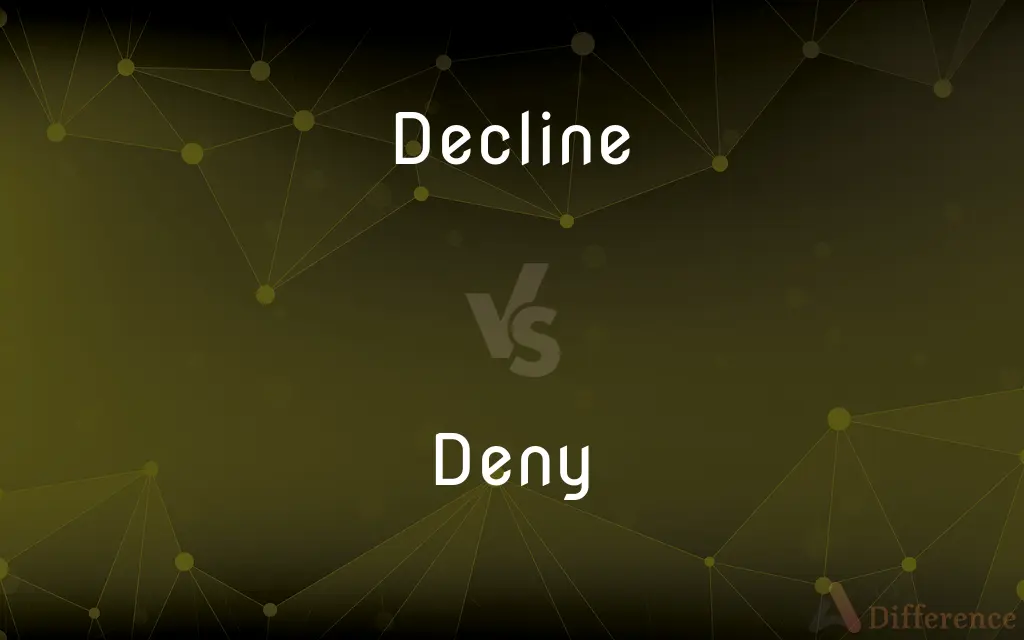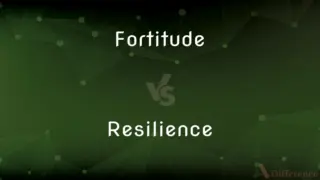Decline vs. Deny — What's the Difference?
Edited by Tayyaba Rehman — By Urooj Arif — Updated on April 25, 2024
Decline" is used to politely refuse an offer or request, indicating a choice not to accept, while "deny" means to reject a statement or fact, often implying a contradiction or refusal of a right or request.

Difference Between Decline and Deny
Table of Contents
ADVERTISEMENT
Key Differences
"Decline" is commonly used when someone chooses not to accept an invitation or proposal, conveying a polite or gentle refusal. On the other hand, "deny" involves a firmer rejection, often of a claim or an assertion, suggesting that something is not true.
In social or business contexts, "decline" is the preferred term for turning down offers or invitations in a way that maintains social grace and professionalism. Whereas, "deny" is often used in legal or formal contexts to reject allegations or rights.
The use of "decline" generally implies discretion and voluntary refusal without asserting incorrectness or falsehood. In contrast, "deny" typically carries a defensive tone, used when someone refutes the validity or truth of something.
"Decline" can also indicate a gradual decrease in quantity, quality, or strength of something, adding another layer of meaning that does not apply to "deny."
While "decline" is often a response to an optional choice, "deny" frequently occurs in situations where there is a challenge to authority, rights, or truth, necessitating a clear and often forceful response.
ADVERTISEMENT
Comparison Chart
Definition
To refuse politely or gently, often an offer or invitation.
To reject a claim or assertion, implying the statement is not true.
Contexts
Social, business (invitations, proposals).
Legal, formal (rights, allegations).
Implication
Choice not to accept, without suggesting falsehood.
Refusal by contradicting or stating something is false.
Tone
Polite, discreet, maintaining social grace.
Defensive, often firm or strong.
Additional Meanings
Can indicate a decrease in status, condition, or value.
Strictly involves rejection of truth or validity.
Compare with Definitions
Decline
To refuse an offer or invitation politely.
She declined the invitation to the party.
Deny
Often used in defensive or legal contexts.
She denied the allegations in court.
Decline
Can be used for choices in a professional context.
The committee declined the proposal after careful consideration.
Deny
Can carry a tone of contradiction.
The witness denied seeing the suspect at the scene.
Decline
Often used to maintain politeness in refusals.
He declined the job offer due to personal reasons.
Deny
Implies rejection of a claim or right.
He was denied access to the classified information.
Decline
Indicates a decrease or reduction.
There has been a decline in sales this quarter.
Deny
To assert that something stated is not true.
The accused denied all charges against him.
Decline
Suggests a voluntary refusal.
She declined to comment on the matter.
Deny
Used when refuting facts or data.
The politician denied the accusations during the interview.
Decline
(typically of something regarded as good) become smaller, fewer, or less; decrease
The birth rate continued to decline
Deny
To declare untrue; assert to be false
"A senior officer denied that any sensitive documents had been stored there" (Scott Ritter).
Decline
Politely refuse (an invitation or offer)
The company declined to comment
Caroline declined the coffee
Deny
To refuse to believe; reject
Deny the existence of evil spirits.
Decline
(especially of the sun) move downwards
The sun began to creep round to the west and to decline
Deny
To refuse to recognize or acknowledge; disavow
The official denied any wrongdoing.
Decline
(in the grammar of Latin, Greek, and certain other languages) state the forms of (a noun, pronoun, or adjective) corresponding to case, number, and gender.
Deny
To decline to grant or allow; refuse
Deny the student's request.
Denied the prisoner food or water.
Decline
A gradual and continuous loss of strength, numbers, quality, or value
A serious decline in bird numbers
A civilization in decline
Deny
To give a refusal to; turn down or away
The protesters were determined not to be denied.
Decline
To express polite refusal
I wanted to invite them but I was afraid they would decline.
Deny
To restrain (oneself) especially from indulgence in pleasures.
Decline
To slope downward; descend
The roof declines at a steep angle.
Deny
(transitive) To disallow or reject.
I wanted to go to the party, but I was denied.
Decline
To bend downward; droop
Boughs declining toward the ground.
Deny
(transitive) To assert that something is not true.
I deny that I was at the party.
Everyone knows he committed the crime, but he still denies it.
Decline
To degrade or lower oneself; stoop
Refused to decline to their level of behavior.
Deny
(ditransitive) To refuse to give or grant something to someone.
My father denied me a good education.
Decline
To deteriorate gradually; fail
His health has been declining for years.
Deny
To take something away from someone; to deprive of.
Decline
To sink, as the setting sun.
Deny
To prevent from scoring.
Decline
To draw to a gradual close
We made our way home as the day declined.
Deny
To disclaim connection with, responsibility for, etc.; to refuse to acknowledge; to disown; to abjure; to disavow.
Decline
To refuse politely
I declined their offer of help. ].
Deny
(obsolete) To refuse (to do or accept something).
Decline
Downward movement, fall.en
Deny
To declare not to be true; to gainsay; to contradict; - opposed to affirm, allow, or admit.
Decline
A sloping downward, e.g. of a hill or road.en
Deny
To refuse (to do something or to accept something); to reject; to decline; to renounce.
Decline
A weakening.en
Deny
To refuse to grant; to withhold; to refuse to gratify or yield to; as, to deny a request.
Who finds not Providence all good and wise,Alike in what it gives, and what denies?
To some men, it is more agreeable to deny a vicious inclination, than to gratify it.
Decline
A reduction or diminution of activity.
Deny
To disclaim connection with, responsibility for, and the like; to refuse to acknowledge; to disown; to abjure; to disavow.
The falsehood of denying his opinion.
Thou thrice denied, yet thrice beloved.
Let him deny himself, and take up his cross.
Decline
The act of declining or refusing something.
Deny
To answer in negative; to declare an assertion not to be true.
Then Sarah denied, saying, I laughed not; for she was afraid.
Decline
(intransitive) To move downwards, to fall, to drop.
The dollar has declined rapidly since 2001.
Deny
Declare untrue; contradict;
He denied the allegations
She denied that she had taken money
Decline
(intransitive) To become weaker or worse.
My health declined in winter.
Deny
Refuse to accept or believe;
He denied his fatal illness
Decline
(transitive) To bend downward; to bring down; to depress; to cause to bend, or fall.
Deny
Refuse to grant, as of a petition or request;
The dean denied the students' request for more physics courses
The prisoners were denied the right to exercise for more than 2 hours a day
Decline
(transitive) To cause to decrease or diminish.
Deny
Refuse to let have;
She denies me every pleasure
He denies her her weekly allowance
Decline
To turn or bend aside; to deviate; to stray; to withdraw.
A line that declines from straightness
Conduct that declines from sound morals
Deny
Deny oneself (something); restrain, especially from indulging in some pleasure;
She denied herself wine and spirits
Decline
(transitive) To choose not to do something; refuse, forbear, refrain.
On reflection I think I will decline your generous offer.
Deny
Deny formally (an allegation of fact by the opposing party) in a legal suit
Decline
To inflect for case, number, gender, and the like.
Deny
Refuse to recognize or acknowledge;
Peter denied Jesus
Decline
To recite all the different declined forms of (a word).
Decline
(by extension) To run through from first to last; to recite in order as though declining a noun.
Decline
To reject a penalty against the opposing team, usually because the result of accepting it would benefit the non-penalized team less than the preceding play.
The team chose to decline the fifteen-yard penalty because their receiver had caught the ball for a thirty-yard gain.
Decline
To bend, or lean downward; to take a downward direction; to bend over or hang down, as from weakness, weariness, despondency, etc.; to condescend.
He . . . would decline even to the lowest of his family.
Disdaining to decline,Slowly he falls, amidst triumphant cries.
The ground at length became broken and declined rapidly.
Decline
To tend or draw towards a close, decay, or extinction; to tend to a less perfect state; to become diminished or impaired; to fail; to sink; to diminish; to lessen; as, the day declines; virtue declines; religion declines; business declines.
That empire must declineWhose chief support and sinews are of coin.
And presume to know . . . Who thrives, and who declines.
Decline
To turn or bend aside; to deviate; to stray; to withdraw; as, a line that declines from straightness; conduct that declines from sound morals.
Yet do I not decline from thy testimonies.
Decline
To turn away; to shun; to refuse; - the opposite of accept or consent; as, he declined, upon principle.
Decline
To bend downward; to bring down; to depress; to cause to bend, or fall.
In melancholy deep, with head declined.
And now fair Phoebus gan decline in hasteHis weary wagon to the western vale.
Decline
To cause to decrease or diminish.
He knoweth his error, but will not seek to decline it.
Decline
To put or turn aside; to turn off or away from; to refuse to undertake or comply with; reject; to shun; to avoid; as, to decline an offer; to decline a contest; he declined any participation with them.
Could IDecline this dreadful hour?
Decline
To inflect, or rehearse in order the changes of grammatical form of; as, to decline a noun or an adjective.
After the first declining of a noun and a verb.
Decline
To run through from first to last; to repeat like a schoolboy declining a noun.
Decline
A falling off; a tendency to a worse state; diminution or decay; deterioration; also, the period when a thing is tending toward extinction or a less perfect state; as, the decline of life; the decline of strength; the decline of virtue and religion.
Their fathers lived in the decline of literature.
Decline
That period of a disorder or paroxysm when the symptoms begin to abate in violence; as, the decline of a fever.
Decline
A gradual sinking and wasting away of the physical faculties; any wasting disease, esp. pulmonary consumption; as, to die of a decline.
Decline
Change toward something smaller or lower
Decline
A condition inferior to an earlier condition; a gradual falling off from a better state
Decline
A gradual decrease; as of stored charge or current
Decline
A downward slope or bend
Decline
Grow worse;
Conditions in the slum worsened
Decline
Refuse to accept;
He refused my offer of hospitality
Decline
Show unwillingness towards;
He declined to join the group on a hike
Decline
Grow smaller;
Interest in the project waned
Decline
Go down;
The roof declines here
Decline
Go down in value;
The stock market corrected
Prices slumped
Decline
Inflect for number, gender, case, etc.,
In many languages, speakers decline nouns, pronouns, and adjectives
Common Curiosities
What does it mean to decline something?
To decline something means to politely refuse or not accept an offer, invitation, or proposal.
When should I use "decline"?
Use "decline" when turning down offers or invitations politely or indicating a reduction or decrease.
When should I use "deny"?
Use "deny" when you need to contradict a statement or claim, especially in formal or legal contexts.
What is an example of using "decline" in a sentence?
"She declined the offer to speak at the conference due to scheduling conflicts."
Can "decline" refer to something other than refusing an offer?
Yes, "decline" can also refer to a decrease or deterioration in condition, value, or quantity.
Is "decline" suitable for formal documents?
Yes, "decline" can be used formally to indicate a polite refusal or a downward trend.
Can "decline" and "deny" be used interchangeably?
No, "decline" is used for polite refusals, often without contradicting, while "deny" is for rejecting assertions or claims as false.
Is "deny" a stronger term than "decline"?
Yes, "deny" often carries a stronger, more defensive connotation compared to the gentler "decline."
What does it mean to deny something?
To deny something means to reject a claim or assertion as false, or to refuse a right or request.
Is "deny" appropriate for personal conversations?
It can be, but it's typically used in more serious or formal disputes rather than casual refusals.
What is an example of using "deny" in a sentence?
"He denied the rumors of his resignation."
How do "decline" and "deny" differ in emotional impact?
"Decline" is less confrontational and more polite, whereas "deny" can be more defensive and firm.
Does "deny" imply a legal setting?
Often, yes, especially when denying allegations, claims, or rights.
Can "decline" imply a rejection without reason?
While "decline" does imply a refusal, it often suggests that the reason, if not explicitly stated, is polite or strategic.
Share Your Discovery

Previous Comparison
Syringe vs. Injector
Next Comparison
Fortitude vs. ResilienceAuthor Spotlight
Written by
Urooj ArifUrooj is a skilled content writer at Ask Difference, known for her exceptional ability to simplify complex topics into engaging and informative content. With a passion for research and a flair for clear, concise writing, she consistently delivers articles that resonate with our diverse audience.
Edited by
Tayyaba RehmanTayyaba Rehman is a distinguished writer, currently serving as a primary contributor to askdifference.com. As a researcher in semantics and etymology, Tayyaba's passion for the complexity of languages and their distinctions has found a perfect home on the platform. Tayyaba delves into the intricacies of language, distinguishing between commonly confused words and phrases, thereby providing clarity for readers worldwide.
















































